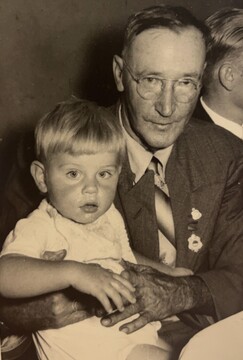
2116
JOLLY, Walter William
| Service Number: | 51882 |
|---|---|
| Enlisted: | Not yet discovered |
| Last Rank: | Private |
| Last Unit: | 50th Infantry Battalion |
| Born: | Georgetown, South Australia, Australia, 28 December 1897 |
| Home Town: | Georgetown, Northern Areas, South Australia |
| Schooling: | Not yet discovered |
| Occupation: | Farm Labourer |
| Died: | Heart Attack, Gladstone, South Australia, Australia, 30 April 1974, aged 76 years |
| Cemetery: |
Gladstone Cemetery (SA) Row K, Plot 769 |
| Memorials: | Georgetown WW1 Roll of Honor |
World War 1 Service
| 1 May 1918: | Involvement Private, 51882, 1st to 6th (SA) Reinforcements, --- :embarkation_roll: roll_number: '20' embarkation_place: Sydney embarkation_ship: HMAT Euripides embarkation_ship_number: A14 public_note: '' | |
|---|---|---|
| 1 May 1918: | Embarked Private, 51882, 1st to 6th (SA) Reinforcements, HMAT Euripides, Sydney | |
| 11 Nov 1918: | Involvement Private, 51882, 50th Infantry Battalion |
Help us honour Walter William Jolly's service by contributing information, stories, and images so that they can be preserved for future generations.
Add my storyBiography contributed by St Ignatius' College
Walter William Jolly was born on December 28, 1897, to Walter Francis Jolly (29) and Agnes Jolly (22), in Georgetown, South Australia. His sister, Ethel Florence, was born on October 28, 1899, when he was nearly two years old. His second sister, Agnes Rachel, was born on October 14, 1906, when he was eight. His brother, Alec Alfred, was born on October 20, 1912, when Walter was 14. His family were wheat farmers. Walter William Jolly was 21 at the age of embarkation on May 1, 1918, and returned to Australia on March 31, 1919, meaning he would have been 22 years old at the end of his service. He was single at the time of the war and had no children.
Walter William Jolly enlisted in his hometown, Georgetown in South Australia, on the 23rd of March 1918. On the 1st of May 1918, he embarked for service overseas aboard the HMAT Euripides in Sydney. He was a part of the 9th Training Battalion of the Australian Imperial Force that was stationed at Fovant, England, as part of the 2nd Training Brigade. The primary role of the 9th Training Battalion was to give advanced training to reinforcements arriving from Australia before they were deployed to the Western Front. He was allotted to the 50th Infantry Battalion on the 4th of July 1918 and left for France on the 22nd of September that same year.
During the time of his service, all major battles of the 50th Battalion had ended, meaning he was likely placed as a reserve or in a support position, helping to reinforce defensive positions, repair trenches, or burying the dead. Patrolling newly captured territory and manning defensive positions would have been an important part of his role, as well as providing logistical support to other units pushing forward against the Germans. Even though he didn’t fight, conditions would have been tough. Food was often basic and dull, with the transport of supplies being disrupted by ongoing battles elsewhere. Mud, waterlogging, and infestations of rats and lice were common in wartime conditions.
Walter William Jolly contracted a severe case of influenza, most likely the Spanish flu, and was transferred to England on the 21st of November 1918, and admitted to Devonport Military Hospital on the 23rd. On the 13th of December, Walter was marked as convalescent, meaning he was now recovering from his illness.
He sailed back to Australia on the SS Khyber on the 3rd of March 1919 and returned on the 31st. He was discharged on the 7th of June 1919.
After the war, Walter William Jolly became a grader driver that helped to make roads, such as the Barrier Highway, which helps to connect South Australia to the far and central west of New South Wales. He was heavily involved in this, and it made up a significant part of his career after the war. He married May Sarah Stephens Jolly on August 21st, 1929, when he was 31 years old, and had 2 children: Glen and Hartley Stephens Jolly. His father passed away at the age of 61, on the 8th of December 1929 in Jamestown, South Australia. His son, Hartley Stephens, was born on the 8th of February 1931 and his other son Glen was born on the 5th of May 1933. His mother passed away on the 19th of August 1969 in Adelaide, Australia, at the age of 94. His poor health due to type 1 diabetes meant he was often in and out of hospital. He passed away due to a heart attack on the 30th of April 1917 at the age of 76.
Bibliography:
Australian War Memorial. “The Australian War Memorial.” Awm.gov.au, 4 Feb. 2019, www.awm.gov.au/.
corporateName =Department of Veterans’ Affairs; address=21 Genge St, Civic/Canberra City. “1918—Villers-Bretonneux to Le Hamel.” Anzac Portal, 2008, anzacportal.dva.gov.au/resources/1918-villers-bretonneux-le-hamel.
“Find War Dead | CWGC.” Www.cwgc.org, www.cwgc.org/find-records/find-war-dead/.
Fujimura, Sara Francis. “Purple Death: The Great Flu of 1918.” Www.paho.org, Pan American Health Organization, 2003, www.paho.org/en/who-we-are/history-paho/purple-death-great-flu-1918.
“Newspapers and Gazettes Category.” Trove, trove.nla.gov.au/help/categories/newspapers-and-gazettes-category.
“Session Manager.” Recordsearch.naa.gov.au, recordsearch.naa.gov.au/.
“The AIF Project.” Adfa.edu.au, 2016, aif.adfa.edu.au/aif/.
“Walter William “Watty” Jolly (1897-1974) - Find A...” Findagrave.com, 2019, www.findagrave.com/memorial/197258366/walter_william-jolly.
“FamilySearch.org.” Familysearch.org, 2015, ancestors.familysearch.org/en/KCYY-V22/walter-william-jolly-1897-1974.
Pedersen, Peter. Anzac Treasures. Allen & Unwin, 1 Oct. 2014.
A significant portion of the research also came directly from family records and recalled stories about his life.











